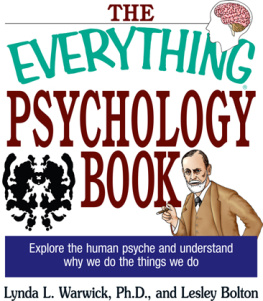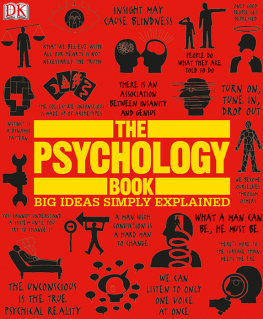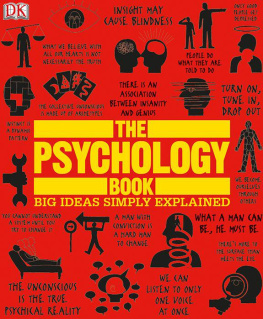An Imprint of Sterling Publishing Co., Inc.
STERLING and the distinctive Sterling logo are registered trademarks of Sterling Publishing Co., Inc.
Cover 2021 Sterling Publishing Co., Inc.
All rights reserved. No part of this publication may be reproduced, stored in a retrieval system, or transmitted in any form or by any means (including electronic, mechanical, photocopying, recording, or otherwise) without prior written permission from the publisher.
All trademarks are the property of their respective owners, are used for editorial purposes only, and the publisher makes no claim of ownership and shall acquire no right, title, or interest in such trademarks by virtue of this publication.
For information about custom editions, special sales, and premium and corporate purchases, please contact Sterling Special Sales at 800-805-5489 or .
Introduction
Everyone in the twentieth century... became her or his own psychologist, able and willing to describe life in psychological terms.
Roger Smith, The Human Sciences, 1997
THE GREAT MEMORY SCIENTIST Hermann Ebbinghaus is often quoted as saying that psychology has a long past, but a short history. Humans have indeed thought about many of the ideas and practices that we now call psychology for a very long time. For about the last 150 years, there has been an effort to develop the scientific study of those ideas. In addition to science, modern psychology is also a profession, with many practices designed to help people live better lives and cope with the demands of society. This duality of psychology makes it a rich and rewarding subject that reaches into every aspect of our lives today.
The Scope of Psychology
Psychologists study topics that are of great interest and usefulness in everyday life, such as childrens development, decision-making, work, sleep, aging, and health and many other topics. Psychologists have also developed a variety of theories about the functioning of the mind, from Freuds energy model to the computer model of Nobel Prize winner Herbert Simon. Therapies designed to help people cope with psychological problems have become an important part of psychologists work, as well.
Modern psychological science and practices developed most rapidly in Europe and North America, but the roots of both science and practice can be found throughout recorded history. As will become apparent in this book, thoughtful people from a variety of times and places have contributed to our understanding of ourselves. For thousands of years, psychological principles were closely linked to religion, philosophy, and medicine, and other systems of thought, including astrology and astronomy. In every civilization there have been people who wrote about the human spirit, about mind and behavior, and tried to understand disorders of the mind. Among people who were not educated or even literate, systems of thought linked to the body, such as palmistry, physiognomy, and phrenology became popular as a way to understand themselves and others.
The Bedside Book of Psychology is about psychological ideas and the people behind those ideas over the centuries. Human and animal psychology have fascinated some of the worlds great thinkers and we will explore what they have said and written about it. For example, the American philosopher and psychologist William James once wrote a friend that psychology is a damnable subject, and all that one may wish to know lies entirely outside it. James wrote this out of exasperation after spending twelve years writing what is considered one of the greatest books in the field, The Principles of Psychology (1890). Clearly, James did not reject psychology; he, in fact, continued to make significant contributions until his death in 1910. His comment may best be understood as reflecting the complexity of psychology. How can we ever understand something as varied as human thought and behavior?
In fact, psychology is one of the most complex of all scientific and professional fields. It often appears at first glance as just a matter of common sense, its truths intuitively accessible or a matter of common folk knowledge. Yet, as we look closer we see that what appeared on the surface as common sense is, in fact, a matter of deep knowledge rich in nuance and subtlety. An example from cognitive psychology may serve as an illustration. Two Israeli psychologists, Daniel Kahneman and Amos Tversky, wondered what might lead people to make decisions that were not rational or in their best interest. They found that when a person has to make a decision in a condition of uncertaintyfor example, when asked whether more people die in plane crashes or automobile accidentsthe person may rely on a mental shortcut or heuristic to help them decide. These shortcuts may be based on the ease with which an example comes to mindthe availability heuristicor by assuming similarity where none existsthe representativeness heuristic. Kahneman and Tversky showed that human beings are not always and perhaps not even primarily rational in making decisions. Of course, Sigmund Freud had argued that humans are not creatures of reason almost a century before Kahneman and Tversky, although he based his arguments on very different evidence. In The Bedside Book of Psychology, we will encounter questions about rationality, emotionality, and their important consequences many times.
What about the multitude of human behaviors that are so important, not only for our personal survival, but for the survival of our species? Freud, as you may know, wrote extensively about human sexuality. He claimed that the most basic motivation in life is sex and that our personalities are shaped very early in life by how we resolve the tensions between pleasure and the dictates of society as embodied in our parents. Before and after Freud, people have theorized about the place of sex in human life and how to understand the powerful sexual urges that most humans feel. In some societies, sexuality is celebrated and open, while in others it is a taboo topic, at least in public. Recently, evolutionary psychologists have theorized that the template for male-female sexual attraction is based in our ancient evolutionary past. Other psychologists argue that sexual attraction is socially constructed and that what we see as desirable is shaped by the environment in which we live.
In todays world of ongoing crises such as the Covid-19 pandemic and climate change, people are concerned about their personal or psychological resources. Their concerns are often expressed in such questions as, How can I be a resilient person? or, Am I able to create and sustain healthy relationships that can help me be a happy and successful person? Human beings have sought answers for these and other questions for millennia. The signs of the zodiac created by various astrological systems from ancient Mesopotamia, Egypt, and medieval Islam were all attempts to understand oneself and others. Palmistry and numerology are also ancient strategies to understand, predict, and control human behavior. Among the ancient Greeks, the Pythagoreans and others developed a sophisticated philosophical system based on numbers and their relationships that were used to understand the world, including human behaviors. In fact, the human body has often been used as a way for people to understand themselves. Physiognomy is an old system for understanding human character by the shape of ones face, and phrenology offered explanations of character and abilities based on the shape and protrusions of the human skull. Similar body-based theories have continued to our own day, with such well-respected developmental psychologists as Jerome Kagan and Nathan Fox claiming that there are typical body differences between shy and non-shy children. In the twentieth century, psychologists developed other approaches that were based on responses to surveys and questionnaires. This allowed for statistical manipulation of the respondents data and resulted in an apparently more scientific approach to personality theory. However, older theories, such as those of Sigmund Freud or Carl Jung, have retained great appeal to millions of people around the world. We will explore several landmark theories of human personality in









